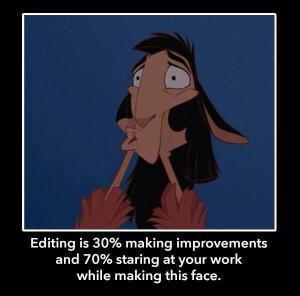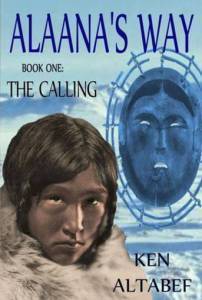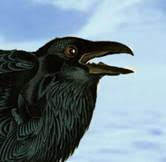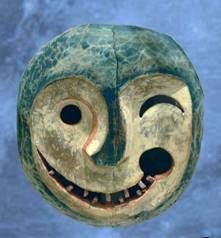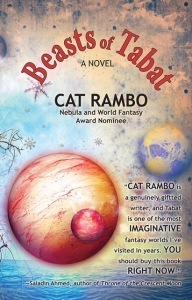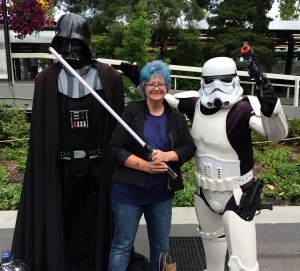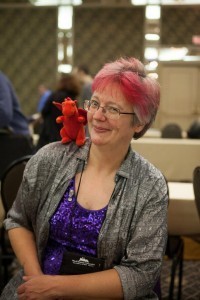Cat Rambo's Blog, page 52
March 6, 2015
Guest Post: Raven Oak on Linguistics in Fantasy—To Thee or Not to Thee
Raven Oak discusses linguistics in fantasy.
“Since your book’s technological advances place it during the Renaissance, your characters are wrong because they should be speaking like Shakespeare.”
Imagine my surprise when a friend and avid fantasy reader said this to me. I can’t remember the last time I met someone who believed that level of linguistic authenticity necessary in a fantasy world. While I love Shakespeare, if every fantasy novel I read was written with historically and culturally accurate language, I’d go mad. I don’t speak German any more than I speak Old English. Egad! Not even the people of Shakespeare’s time spoke like Shakespeare.
Imagine if The Lord of the Rings trilogy were written like this:When Mister Bilbo Baggins of Bag Endeth announc’d that he wouldst shortly be
celebrating his eleventy-first birthday with a party of special
magnificence, thither was much talketh and excitement in Hobbiton.
Or like this:
Hwanne Dryhten Bilbo Baggins of Faetels Ende abeodan se he dulmúnus aer gebréfan beon he endleofan-fyrest ongean a gebéorscipe fram déore, þider beon fela acwepan end onwæcenness in Hobbiton.
Not so bad in Shakespeare’s tongue, but how enjoyable would the reading be in Old English?
It’s a common misconception that all fantasy is based upon medieval Europe, and everyone talks like they’re in a Shakespeare play.
One reason I call shenanigans on this misconception is that when the day is done, it’s fantasy. It’s up to the author to build a believable world however they wish. That’s not to say that linguistics doesn’t play a crucial role in world building, but as the author, you have some wiggle room in how you develop your world or universe.
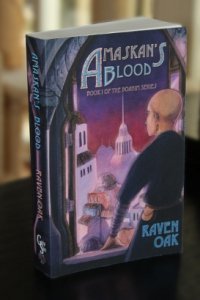 In my fantasy novel, Amaskan’s Blood, the world of Boahim consists of twelve kingdoms. Each one has their own culture that I built from a mixture of Earth cultures. But at its core, Boahim is a fantasy world that doesn’t exist on planet Earth and never did. I can set their scientific advances to be comparable to Middle Ages France, and yet, use magic to control indoor plumbing if I wish.
In my fantasy novel, Amaskan’s Blood, the world of Boahim consists of twelve kingdoms. Each one has their own culture that I built from a mixture of Earth cultures. But at its core, Boahim is a fantasy world that doesn’t exist on planet Earth and never did. I can set their scientific advances to be comparable to Middle Ages France, and yet, use magic to control indoor plumbing if I wish.
But what about linguistics? More specifically, word choice? If a kingdom is based on Renaissance France, must I write the novel in Old French? Tolkien certainly didn’t, and he was a linguistics master.
Yet Linguistics is more than word choice. It’s phonetics, morphology, syntax, semantics, pragmatics, and the order of parts of speech. (You can read more on each of these here.) These are all elements an author must consider as they write a story in a fantasy world.
Rather than dealing with absolutes, writers should consider linguistics as an essential piece of world building. You would no more have a character in Renaissance France talking about gigabytes or than you would a scullery maid speak with a refined and educated diction.
So how do we find balance with our linguistics?
Your language must be believable. It should fit the time period and culture of the society, unless it has a strong reason not to do so.
Don’t overdo it with newly invented words. If I need a glossary at the end of the book to translate all your made up words, I’ll be sucked out of my enjoyment to do “homework.” Harry Harrison’s West of Eden comes to mind. I made it twenty pages in before the chore of translation drove me to toss the book in the “donate” bin.
Don’t overdo dialects. Dialects are also indications of language and cultural status, and should be used sparingly. If over used, it can fatigue the reader. (You can read more about dialect here.)
While Tolkien sprinkled bits of Sindarin, Khuzdul, and the Black Speech throughout his trilogy, he did so sparingly enough that it became flavor text—enrichment to his world building rather than a stopping block for the reader. That should be the author’s goal as well—enrichment.
While revising my fantasy novel, I kept a running list of terms that felt modern or out of place as I reread the novel. Then I used the Online Etymology Dictionary to look up the offending words. (There were over 300 of them, but it was well worth looking them up to ensure a good reading experience.)
For example, the word faux pas, French for false-step, dates back to 1670. In Boahim, one kingdom’s culture is heavily influenced by Renaissance France. It made sense in my timeline and culture for the word faux pas to exist. All that was left was double-checking whether a particular character would know and use the word. Word choice is as much a part of who your character is as the culture in which they belong.
If the time period or culture had been wrong—say from the 1800’s—it’s my job then to research why/how the word came about. I would have to make the ultimate choice on whether that word fit into the world I’ve established and the character using it.
Ultimately, it is up to the writer to build their world and decide what the characters would and would not know. Do your homework with your world building, and we’ll gladly follow the characters on their journey.
Bio: Raven Oak is the author of the bestselling fantasy novel, Amaskan’s Blood, and the upcoming sci-fi novels, Class-M Exile and The Silent Frontier. She spent most of her K-12 education doodling stories and 500 page monstrosities that are forever locked away in a filing cabinet.
She lives in Seattle, WA with her husband, and their three kitties who enjoy lounging across the keyboard when writing deadlines approach.
For more information and excerpts, visit http://www.ravenoak.net
Raven can also be found on the following sites:
Twitter: @raven_oak
Facebook: http://facebook.com/authorroak
Goodreads: https://www.goodreads.com/raven_oak
Google+: https://www.google.com/+RavenOak
YouTube: https://www.youtube.com/user/kaonevar/
March 5, 2015
Answering More Questions About the SFWA Qualifying Process
If you have questions, or are having difficulties with the online form, you can mail them to me or the SFWA office.
I encourage questions — it’s how we’re compiling a FAQ — so ask away!Here’s some stuff that’s come up:
One thing that is part of the confusion is that we have 2 entities, the SFWA Qualifying Markets list, where a publication is an auto-accept and then pretty much other markets that aren’t on that list but which meet the 6 cents a word requirement. Right now we’re looking at those on a case by case basis and trying to figure out good rules.
At the same time, crowd-funded source is eligible if it pays AND the book is delivered (because we thought that was important.) To get on the SFWA Qualifying Markets list, you must meet certain criteria, including having been around a while. On the other hand, you can qualify with a market that is not on the list, you just have to show us it’s legit.
Net versus gross: mainly we’re trying to weed anyone out who’s trying to buy their way in by spending a lot on the selfpub equivalent of a vanity press. We know there are problems with this approach; I personally hope it will be dispensed with, but that remains to be seen.
A single work: People have pointed out that for some people it’s about writing quantity, and wonder if the sales amount couldn’t be split between multiple books. It’s certainly worth discussing, but I dunno. I would need a little more convincing.
Somewhat predictably, many people think the dollar figure should be different although mileage varies as to which direction that goes in.
I’ve been watching some new members come in, and others re-join because they’re happy about this direction. I’d be among the first to apologize for it taking so long, but I will point out that we will look at crowdfunded money where other organizations, as far as I do, don’t yet.
I was thinking about doing a Google Hangout on Air to answer questions, is that something people might be interested in?
Guest Post from Rhonda Eudaly: Writing Is Only Glamorous Until This Face Appears
Joseph Eastwood’s Facebook Meme Card
Note from Cat: today’s guest blog post comes from Rhonda Eudaly. It’s the latest installment in the cavalcade of content here celebrating the upcoming release of my first novel, Beasts of Tabat.I thought long and hard about what to write about for this guest post opportunity. It’s like a bizarre Open Mic Night thing. Most of you don’t know me, but I can’t see my hecklers until it’s too late. So what to do? Try to be pithy? Try to be funny? Then the Meme Card came up on Facebook… Editing is 30% Improvement and 70% making this face. And so…is this thing on?
There’s a lot to learn when it comes to writing. You can do it for years and years and still learn stuff (in fact, my opinion is that you should always be learning stuff). I’ve done quite a bit of short story work for…a while…now, as well as working on braided novels and a couple of other formats. And while those are great, I’m currently doing the final edit on my novel before it’s published. And, well, FACE.
Doing a solo novel, especially for the first time, is so different from anything else I’ve ever done. First was the editorial phone call, which – while supportive also made me wonder what the heck I was thinking sending out this…thing. When the manuscript came back, I prepared for the red, but was a complete wuss about looking at it. Fortunately, there are whole pages that don’t have marks on them…and I’ll take what I can get – but still…ow. What made it better? Was hearing J. Kathleen Cheney say, “My editor made me rewrite the back half of my book…”
Editing with a buddy.
Then the other real work began. Reading through and seeing the problems and notes and implementing them. As with initial drafts, I’m a Pen/Paper person. I like ink, and the low tech version meant I could carry it with me wherever I went – in case there was an opportunity to work on it. It helped that I was diving in right around ConDFW, where I’m surrounded by support. Cheney, offer to do a “pre-final” read through for me. It gave her an excuse to procrastinate on something, so win/win.Now, I’m in the process of a strange hybrid editing…thing. I had my electronic file of the manuscript. I had the track changes file from Cheney, and the paper edits. Time to learn a new skill – which I did. I combined the two electronic files first and creating yet another file (in Word 2007 and up, it’s in the “Review” ribbon under “Compare” nifty little trick). Now, while I’m inputting my paper edits mostly from my publisher/editor, but some I made one my own, I also have Cheney’s notes. Made my life easier, but still…there’s the FACE.
Making editing more comfortable.
Seriously? In some cases, WHAT DID I DO? What is that sentence? Thank Goodness for editors and friends – and this is AFTER it’s been through other people and sent out to publishers for – because yeesh. I’m still kinda embarrassed about what I sent out to several editors before this one took the chance on me. Editors are a good, good thing. The editing process is not glamorous. It’s not at all fun – not like that first blush of a new story or a new set of characters – but it’s a necessary thing. My goal is to make the FACE less and less going forward, but I also don’t want to be solely responsible for brilliance. It’s just too much of a burden, and by having good editors (and friends) involved, the story is stronger than I could’ve made it on my own.So listen to your editors. They’re like Mothers. They know what they’re talking about, and they know what’s good for you, and just maybe help make that 30/70% ratio will skew higher.
Bio: Rhonda Eudaly lives in Arlington, Texas with her husband, and two dogs. She’s ventured into several industries and occupations for a wide variety of experience. She has a well-rounded publication history in both fiction and non-fiction many of which can be found on www.RhondaEudaly.com.
#sfwapro
March 4, 2015
Guest Post from Ken Altabef: Designing a Fantasy World Around Inuit Myth
An insatiable fever demon…
A restless Wind spirit…
A treacherous shaman…
A golden walrus…
And one courageous young girl.
The mythology is peppered with impressive spirits with interesting names. But aside from a name and a job description there’s little else to go on. So when I decided to write ALAANA’S WAY, an epic fantasy series about the first female shaman in an arctic world based on Inuit myth, I had my hands full. As shaman it’s Alaana’s duty to negotiate with the great spirits, and they all became colorful characters in the story. Their appearance and personalities were entirely up to me.
Another problem. A nomadic lifestyle, the vagaries of a mostly oral tradition and a fractured tribal system leave little agreement between different versions of the same story. Even the most established figure, Sedna, Mistress of the Sea, owns multiple conflicting origin stories. One version claims she was the daughter of two giants with such an uncontrollable urge for flesh that she tried to devour her parents in their sleep. Another tribe insists she was a young beauty forced to marry an elderly neighbor who turned out to be a monstrous carrion bird, leaving her no route of escape except a plunge into the salty depths. Or perhaps she was a poor orphan girl mistreated and cast into the sea by the other children; her fingers, chopped off as she clung desperately to the side of the kayak, fell into the water to become the walruses and seal. I had to tread carefully here. I decided, in a flash of Solomon-like insight, that all of them were true. I supposed that in the Beforetime, where dreams were reality, she was all those things, lived all those lives. But here and now she is simply Sedna, the Sea Mother who controls all the animals in the ocean.
 Another established figure is Tulukkaruq, the Raven, who always represents a mischievous spirit in Native American folklore. The Inuit Raven is impressive indeed, having been credited with creating human beings and bestowng the gift of fire on us as well. But really, this one was easy. I gave him the personality of the Dark Knight’s Joker and urged him to plague both my shamanic heroine and her villainous nemesis in equal measure.
Another established figure is Tulukkaruq, the Raven, who always represents a mischievous spirit in Native American folklore. The Inuit Raven is impressive indeed, having been credited with creating human beings and bestowng the gift of fire on us as well. But really, this one was easy. I gave him the personality of the Dark Knight’s Joker and urged him to plague both my shamanic heroine and her villainous nemesis in equal measure.
But what about the rest? Interpreting an entire pantheon is a daunting task, but I never flinched. I’m a fantasist. This is what I live for.
Tornarssuk
Consider Tornarssuk the guardian spirit of the polar bears. The name spoke to me. I pictured an enormous shimmering white bear with starry eyes. He would be fierce and deadly but also benevolent and wise, with a soft spot for human beings as well. Tekkeitsertok is the guardian of the caribou, so a tawny-furred man with cloven hooves and an impressive rack of antlers. I figured he was an old and docile spirit, more interested in sleeping than fighting, but he does get into at least one good brawl before the series’ end. The Whale-Man may appear as a gigantic black bowhead or a Poseidon-like man, and let’s make him the estranged lover of Sedna for good measure. I wrote a scene in book four where the two have a torrential undersea battle, her sharks on one side vs his whales on the other.What about Erlaveersinioq, the Skeleton Who Walks, a terrifying spirit who loves murder and death above all things? I guess we can chalk him up in the villain’s column. Sila, spirit of the Wild Wind, was a wild card but in the southern tribes he is also the spirit of justice. Let’s put him with the heroes, but leave some question as to whether he’ll really show up to help. As for the snowy owl who leads the souls of the dead across the great divide, she should be petite and cute, with a light as bright as sunlight on fresh snow. Narssuk, who controls the weather, is an insane sky baby who lets down his caribou skin diaper to issue a stormy blast of thunder and snow.
Raven
Somewhere along the line I found mention of the Tunrit, a race of people who lived in the arctic before the Raven created human beings. A race of prehistoric supermen. I could find nothing more about them except for the name of the tribe, but that was enough. I had found my villain. A promethean figure among the first men, who had wrestled sabre-toothed tigers and brought the sun from the other side of the sky, and who turned to sorcery to atone for that terrible mistake.So are my versions of these mythological figures accurate? Probably not, since they came mostly out of my own imagination. But they might be. And that’s an important point. In dealing with a cultural belief system, albeit an archaic and disfavored one, I felt a duty to be respectful. My books sit proudly on the shelves of the Toronto Public Library and in a home for wayward Inuit boys in Nunavut, Alaska. In correspondence I’ve received from Inuit people reaction varies from praise for giving these mythological figures new life, to a stoic acknowledgement of the fact that at least I didn’t contradict anything.
That last is not entirely true. A pivotal figure in the series is the Moon-Man. Many Inuit tribes posit the familiar Native American myth that the lecherous Moon-Man chases his sister the Sun across the sky each day in hopes of an incestuous liaison. This didn’t fit in with my elderly, romantic Moon-Man nor my version of the Sun as an extraterrestrial spirit. What to do? I decided to have my shamanic heroine Alaana ask the Moon-Man, on one her soul-flights to his realm, if the story was true. “Oh no,” he says, “that’s just a story people tell.” So at least the contradiction comes right out of the mouth of the Moon-Man himself. Who could argue with that?
Moon Mask
#sfwapro
March 3, 2015
Guest Post from Sandra Odell: Fantasy Audio
Check out Audible.com for even more audio fiction.
Do you recall being read to as a child? The highs and lows of a familiar voice lulling you to sleep or keeping you entertained, if only for a few minutes? Where did it happen? In bed? Curled up together on the couch or in a favorite chair? On the subway? Outside under a tree? What did the voices read? Works by Laura Ingalls Wilder? Doctor Seuss? Langston Hughes? Judy Blume? Staples such as Goodnight Moon, Pat the Bunny, The Hobbit, There’s A Monster At The End Of This Book, any of the Harry Potter books?Readng to as a child stimulates a number of areas of growth: language development; social bonding; letter and color recognition. Not that the child cares about any of that. Reading fantasy to a child opens up worlds of possibility. When done right, all the child cares about is the next line in the story, the next fantastic moment and location that will sweep them away to somewhere wondrous where they don’t have to do chores, finish homework, or hurt, if only for a little while.
The same can be said for audio fantasy fiction as an adult. Load an audio book, click on your favorite podcast, and let someone tell you a story. I’m not talking radio dramas or stage performances, though those have their merits. I mean a story or novel, something with the “he said”, “she did”, “they saw” intact, A full package deal with one narrator or many, sound effects and music or a bare bones production. There is something about listening to a story that allows our thoughts to soar. We focus on the wonder of the written word brought to life by the tradition of passing tales from one generation to another. Good stories make us feel. Great stories make us think.
All of the above is a fancy way of saying “I like audio fiction.”
The development of easily accessibly audio fiction has opened doors to a whole new audience of readers. Whether on a bus, at home alone, in the gym, driving to work, or “too busy to read”, audio fiction is the perfect hands-free medium to indulge yourself in a bit of fancy while continuing about your day. I often listen to stories while doing household chores, and audio books frequently transform rush hour traffic into quality time. At night, I put myself to bed with my favorite fantasy or horror fiction podcast. I have friends who listen to books while jogging or working out, and one who keeps a CD collection of Bradbury’s works in the bathroom so she can “read in the tub.”
SF/F/H/YA fiction have benefited from a variety of audio markets that allow readers to sample new authors, revisit old favorites, and delve into new areas of interest. Larger chain bookstores rarely deviate from the regular offerings of the major publishing houses. Audio fiction allows you to mix it up a bit, seek out different voices, under represented voices, women writers, LGBTQ writers, writers of color, writers with disabilities.
Services such as iTunes, Audible.com, and Blackstone Audio offer short story collections and a range of full length novels. A growing number of genre fiction podcasts present a selection of short fiction from both new authors and seasoned, award-winning writers of note. Certain podcasts also produce classic genre stories that might otherwise be overlooked by modern readers in the hurry and crush to buy the next mass-market best seller. Not that there’s anything wrong with best sellers. I listen to those as well.
Audio fiction is often free in the case of podcasts, is relatively cost competitive when compared to physical books or eBooks, and is often far more portable. Multicast productions present distinct character voices, while certain narrators are skilled enough to breathe life into the story with the barest of inflections. Most podcasts are produced under a creative commons license that encourages you to share the work with friends or on any number of social media platforms so long as you don’t change the attribution or the production itself. You can loan someone an audio CD or file of a downloaded work, but please don’t give copies away. Like writers, narrators and sound crews work hard to produce the best product possible and deserve to be paid for their efforts.
So, it’s a big audio world out there. Where do you start? Check out the links to some of my favorite genre fiction podcasts below and see what tickles your ears’ fancy.
Podcastle: http://podcastle.org/
Pseudopod: http://pseudopod.org/
Escape Pod: http://escapepod.org/
The Drabblecast: http://www.drabblecast.org/
Cast of Wonders: http://www.castofwonders.org/
Clarkesworld Magazine: http://clarkesworldmagazine.com
Toasted Cake: http://toastedcake.com/
#sfwapro
Ten Plots Generated from Other People’s Problems
 All taken from http://www.helpineedhelp.com/#/
All taken from http://www.helpineedhelp.com/#/
I don’t like my eyebrows.
I’ve never been kissed.
I don’t want to clean up my mess.
I’m involved in a gang.
I don’t know if I’m gay.
I want my cat to be a cover model.
I don’t know if I’m depressed/colorblind.
I’m racist.
I’m overstimulated.
I have ghosts.
I’m always wrong.
March 2, 2015
Guest Post from Kim Mainord: Mileage May Vary
You can find more of Kim’s words at her website, ninjakeyboard.blogspot.com.
(Warning: there is a terrible pun below. If you are allergic to groaning please enjoy this cartoon instead. http://youtu.be/ykwqXuMPsoc)
When I decided that I wanted to be a writer when I grew up I started collecting writing advice. Not tidbits from websites or manuals written by literati who wouldn’t touch a genre novel with a ten-foot pole. I went to my favorite authors, batted my puppy dog eyes, and said, “Please sir, I’d like some more.”
All right, I didn’t have to be that persuasive. Good thing too. I was so nervous I looked like Shaggy on espresso. Anyway…
One of the pieces of advice I received most often was “don’t give up” or some variation thereof. At that point in time I was still pretty naive. I had yet to complete my first story, I didn’t know about the caprices of the market, or the sting of rejection. What I did know what that this was the only career I truly wanted and there was no way I would ever consider quitting.
Oh, the schadenfreude when life proves me wrong.
What I failed to understand was that sooner or later we all have that moment. There’s no magical egg timer ticking away, warning us that it’s coming. No, like a regretful ex it rings when you least expect it and fills your life with woe.
Woe, man.
(Sorry. I couldn’t resist.)
Just like the timing, the cause is different too. It could be the daily grind, the solitude, the rejection, the one star reviews, publisher hijinks, internet trolls, etc. Whatever it may be it brings us so low that the easy 9 – 5 looks really appealing.
For some people it happens before the completion of that first trunk novel. For others it’s during a yearlong drought after a series of pro sales. Maybe it comes when that self-published book doesn’t do as well as you wanted. It may come in twenty years when arthritic hands insist that retirement is a good idea.
Whenever it happens the choice is the same. Tough it out or pack it in. It’s never an easy decision. But you know what? There are so many options now. Hands aren’t able to type anymore? Get voice recognition software. Self-published book not doing well? Time to try a different promotion tactic. Feeling lonely? Get some writer friends to join you in a G+ hangout or on face time. Rejection slips piling up? Use them to make lewd origami.
There are so many options, and resources for writers now there really isn’t a good reason to quit. Everything from support groups to indie publishing forums is a click away. It’s awesome!
Yes, being a writer can be hard. Publishing can twist your brain into knots faster than a Mensa puzzle. But it’s also one of the most fun, and exciting fields I know. What other occupation allows you research bomb construction techniques without fear of arrest? This is the best job around! It would be a shame to miss any of it.
If you want to know what Kim May be doing next, check out her blog: http://ninjakeyboard.blogspot.com.
#sfwapro
And So March Begins
Cover for Beasts of Tabat, first volume in the Tabat Quartet.
Things are cranking away as we get ready for the book release. Here’s the cover – the typo that some of you will notice has been addressed.
The book will be available at Emerald City Comicon — find me there at one of my panels, or stop by the Wordfire Press table, which is where I’ll be hanging out when not stalking John Barrowman.
Those panels will be:
Friday, March 27: Fueling Creativity: Sci-Fi and Fantasy Authors on Ideas
Room: Hall B (WSCC 602-603)
Time: 3:30PM – 4:20PM
Moderator: David Hulton
Guest(s): Cat Rambo, Greg Bear, Ramez Naam, Jason M. Hough, Myke Cole
Authors often dread the interview question “where did you get the idea for this book?” because the answer is never simple. There’s rarely a single moment where an entire plot or world comes to mind. This panel is an exploration of why that’s such a difficult question to answer. Our panel of novelists will discuss the many ways they find inspiration for their work. In addition, they’ll talk about the wonderful and often strange ways an idea will find its way into a novel.
Sunday, March 29: Infinite Diversity in Infinite Combinations
Room: Hall B (WSCC 602-603)
Time: 10:30AM – 11:20AM
Moderator: Anna Alexander
Guest(s): Cat Rambo, Garth Reasby
Diversity in entertainment is both vital and challenging. This panel of novelists will cover how to effectively write compelling characters who are different than you and how to deal with critics of who you are versus your work. Panelists include Anna Alexander, Jamie Ford, Cat Rambo, Aaron Duran, J.R. Terrel, Garth Reasby, and Sarah Remy.
I’ll also be appearing at ICFA March 18-22, and will be leading an informational meeting about SFWA there.
Plenty of stuff is lined up for the blog over the next two months, including:
Several giveaways
Lots of guest posts, including experts talking about writing for games and comic books, how to write more than one series at the same time, food and fantasy, writing collaboratively, and more!
Pieces of original fiction related to the book
Essays on the writers that influenced the book
Links to appearances elsewhere
Snippets from the sequel, Hearts of Tabat
I will not be teaching or taking on any new editing projects in March; I will be mailing out soon about April and May classes.
#sfwapro
How to Apply for SFWA Membership with Small Press or Self-Published Credentials
Preparing to take on even more challenges ahead.
As you may know, the Science Fiction and Fantasy Writers of America, (aka SFWA) had a membership vote and changed their membership criteria pretty drastically, admitting self-published and small press members to apply if they can prove they’re making an amount of money equivalent to the advance a writer would make from a traditional publisher and qualify for SFWA: three thousand dollars over the course of a year. The year does not need to be Jan-Dec, and it can be any period after January 1, 2013.Income can come from crowdfunding, but in that case, the book must have been delivered to the funders in a timely fashion. You can combine advance and royalties, but they must fall in the same twelve months.
The income is net, not gross. If you spend ten thousand bucks printing books and then sell them for three thousand dollars, that would not count. Mainly this is there to keep people from faking their way in and I’m not too worried about small publishing expenses counting here, myself.
How do you prove income? Right now, we’ll look at whatever people think is reasonable. As the month progresses, we’ll start knowing what is and isn’t reasonable.
This is all very new, and I know we’ll be deciding many cases as we go along. I also expect there will be delays at first as we get the process working and people flowing through the pipeline.
You can find out more on the SFWA site. The application form is there. I apologize for the fact that it’s not entirely suited to self-pub apps so far – we’re working on that, and I’d be glad to hear your suggestions.
Got questions? I can answer them here if you like.
Note from a question that arose in this morning’s e-mail: Active members CAN qualify through self-published short fiction; that got left out of the official webpage and I’ve got a request in to add it.
February 6, 2015
SFWA Presidential Platform Statement
Visiting with a constituent at World Fantasy Con.
Dear SFWA members:Yep, I’m running for President, even though that’s a two year term. I’ve got a number of projects I want to see through, and this seems the best way to do it. The self-pub and small press qualifications amendment has passed, and I’d like to help SFWA adjust to that large change.
You’ve seen me in action as vice president for a year. I don’t know that it was the most representative year since I spent most of it on the road, but I think I’ve demonstrated that even when other stuff crops up, I do stick around. I had to put a couple of projects on the back burner while waiting for the selfpub/small press qualifiying vote to shake out but now that the vote has passed, I hope to pick up those loose ends. By now, I’m starting to get more of a handle for the internal workings of SFWA, and that should help me be even more effective.
I’ve fixed a few small problems, and I’ve got some other stuff in motion that will solve others. Some of that is fairly visible, such as the push to make it easier for volunteers to find roles within SFWA. Overall SFWA is still suffering some growing pains, and I’ve found my experience as management very helpful there.
Most of you that have worked with me know that I’ve got decent people skills and a solid work ethic. When it comes to the various factions that clash occasionally, I’ve got friends on most sides and pride myself on trying to listen and understand where people are coming from. I’ve tried to be good about touching base with other members of the SFWA team and working well with them, including weekly Google Hangout sessions and phone calls. I don’t mind admitting when I’m wrong, and I try to learn from both my mistakes and what other people pass along. Aside from deciding to run, I am reasonably sane.
I do have other commitments. My first novel comes out this year, its sequel is only half done, and I have family responsibilities. But I removed all other volunteer work last year in order to focus that energy on SFWA, and will continue to do so while in office.
I’d like to mention a major reason I feel comfortable running: some of the people I know will continue to be part of the team. SFWA’s Office Coordinator Kate Baker has been a pleasure to work with this year, alerting me to potential problems, working quickly to identify and solve issues, and going above and beyond on multiple occasions. Along the same lines, our CFO Bud Sparhawk is constantly savvy and on the ball and knows what’s going on, while PR representative Jaym Gates has put a great deal of work into expanding SFWA’s presence in multiple venues. My dream VP has stepped up (I’ll let them post their own announcement rather than out them, though.) Archimedes only needed a lever and a fulcrum to put it on in order to move worlds; give me a high performance team, and I know I can work some wonders for the org.
Here’s my VP statement from last year, with some annotations on the goals about how close (or not) I came.
I joined SFWA in 2005, as soon as I made my first qualifying sale. Among the work I’ve done for SFWA are stints on the Nebula short fiction and Norton juries, work with the Copyright Committee, interviews and articles for the SFWA blog, articles for the SFWA Bulletin, assisting with the YA-SIG’s move to a mailing list, and helping develop guidelines for and moderating the discussion forums. At the time I joined, I was excited and proud to be joining the ranks of so many writers I’ve admired, and I continue to be an enthusiastic advocate for and supporter of SFWA.
I have worked with the current administration and know that I can interact smoothly with it to maintain and continue to build the organization as a valuable resource for speculative fiction writers and one whose members can take pride in their membership. I’m pleased to see SFWA continuing to adapt to changes in the publishing landscape, such as the recent rate increase for SFWA-qualifying markets and the work of the Self-Publishing committee, and hope to lead similar efforts.
My priorities as a board officer include:
Building SFWA’s name and influence by reaching out to both established and newer F&SF writers who have not joined but would find it useful. I’d like to see SFWA’s social media presence continue to expand and to work to interest and intrigue potential members.
(I don’t know that I’ve accomplished this in the way that I would have liked. I’ve reached out to some writers, and I’ve tried to build our presence here where I could, but much remains to be done. I’m very excited about the launch of the upcoming SFWA Youtube channel under the able administration of Juliette Wade.)
Preserving SFWA’s institutional memory through archives and collecting existing information.
(Much of this was already underway when I came onboard in the form of the OPPM and the archive project led by Lynne Thomas. I’ve contributed where I can and helped enable some upcoming efforts. I’ve also been reaching out to some places to gather information for the forthcoming new Nebula Awards website and coordinating getting content written.)
Improving the existing volunteer structure in order to more effectively connect volunteers with SFWA’s needs, as well as recognizing and rewarding volunteers more consistently.
(Okay, I’ve done a lot here. We’ve gone from a basically moribund system to one where a number of volunteers are doing interesting things. There’s a group of about a dozen people I still need to find roles for and I HEARTILY apologize to you folks but it’s been kinda crazy. We’re working on bringing in a paid volunteer coordinator. There’s a special discussion board forum for volunteers that includes listings of available roles. I’m also trying to make sure we recognize and aid our volunteers: there will be a volunteer recognition breakfast at the Nebulas Sunday morning that has several cool things lined up for it and we’ve had two actual volunteer newsletters so far with every reason to suspect there will be more.)
Assisting SFWA as it determines qualifications for self-published writers as well as how it can best serve such writers.
(DONE. As I’ve said on the discussion boards I fully expect to see this process launched successfully on March 1 with people able to immediately apply.)
Working to address internal miscommunications by better communicating what the board is doing and how people can assist in such efforts. I’d like to help current volunteers and SFWA officers tell other members what they do.
(We’re still working on some of this, but we’re getting better. I have tried to be responsive on the discussion boards whenever questions arose and I’ve made it a point to get to SFWA informational and reading events whenever possible.)
My primary role as VP, though, would be to support SFWA’s President. To assist me in that role, I’ve got good people skills, a sense of humor, and the fact that I don’t take myself overly seriously. I will continue to represent SFWA with the enthusiasm and respect such an august organization deserves.
/End VP Statement
A half year later, my sense of humor remains intact, as does my enthusiasm and respect. It’s certainly been an interesting six months. I’m willing to stick around, if you are willing to trust me to lead you as best I can.
My updated professional qualifications:
I’ve worked as both a writer and an editor. I have over 100 original short story publications, including in such places as Asimov’s, Weird Tales, and Tor.com, and four collections (three solo, one with Jeff VanderMeer). In 2015 my novel BEASTS OF TABAT (the first of a fantasy quartet) will appear from Kevin J. Anderson and Rebecca Moesta’s excellent publishing house, Wordfire Press, while Hydra House will be publishing another two-sided story collection, NEITHER HERE NOR THERE.
My short story, “Five Ways to Fall in Love on Planet Porcelain,” was a 2012 Nebula nominee, while other works have been nominated for the Locus Award and the Million Writers Award. I was the editor for several years of award-winning Fantasy Magazine, receiving a 2012 World Fantasy nomination for my efforts there, and I most recently guest-edited Lightspeed Magazine’s Women Destroy Fantasy issue. I have worked as a volunteer with multiple speculative fiction organizations, including Broad Universe and the Clarion West Writers Workshop.
I’m currently creating the 2015 edition of CREATING AN ONLINE PRESENCE, a guidebook for writers trying to navigate the confusing world of online self-promotion. I teach a popular series of online classes on writing and editing and do some podcast narration.
I am a frequent convention-goer and make a point of organizing or participating in SFWA activities when they’re available at such gatherings. This year, I will be attending ICFA, Emerald City ComicCon, Norwescon, the Nebula Award ceremony, the Locus Awards, GenCon, and Worldcon.



